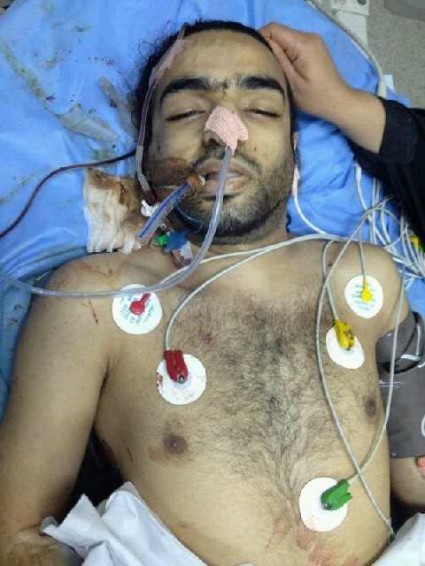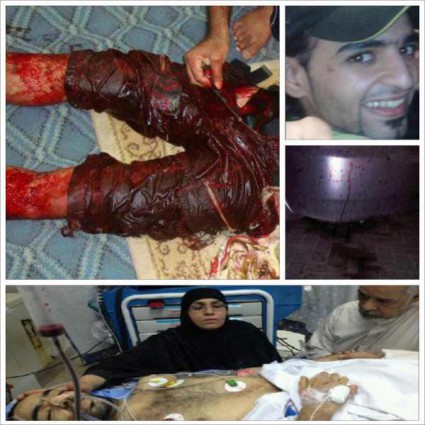Ahmed Ismail, Assassinated by MOI Plain Clothes Operatives while filming a Peaceful Protest, 30 March, 2012
Bahrain: Armed civilians affiliated with the security forces kill a citizen journalist
31 March 2012 – Bahrain Center for Human Rights
Bahrain Center for Human Rights condemns the continued use of excessive force against unarmed protesters and the targeting of media people who cover these protests that has resulted in a new death of a cameraman.
Citizen journalist and cameraman, Ahmed Ismael Hassan AlSamadi, (22 years old) from Salmabad, was shot in the right thigh (lower abdomen) last night at around 01:30 AM 31 March 2012, and was later announced dead. According to eye witnesses, there was peaceful protest in Salmabad which was suppressed by security forces with tear gas and rubber bullets. Armed men in a civilian car (Toyota Land Cruisers) accompanying the security forces were shooting live rounds at protesters.
Witnesses said Ahmed was filming the violations of security forces. At approximately 1:30 am he was shot with a laser-guided weapon by one of the civilian vehicles accompanying the formal security forces. He was hit in the upper right thigh (lower abdomen), as he was targeted for holding a video camera. (top right – photo of the camera with Ahmed’s blood on it). …more
March 31, 2012 No Comments
Saudi oil fields may go up in flames as King Abdullah agitates conflict with Syria
Clinton in Saudi amid oil supply concerns
30 March, 2012 – Al-Akhbar
US Secretary of State Hillary Clinton met Saudi Arabia’s king and foreign minister in Riyadh on Friday to discuss the Syria conflict against a backdrop of tension with Iran and oil policy differences.
The world’s main superpower and its top oil exporter have been strategic allies since the 1940s, but discord over how to respond to Arab popular uprisings strained relations last year.
“Both sides have recognized that their common interests are much more significant than the issues that have recently been dividing them,” said Robert Jordan, US ambassador to Saudi Arabia from 2001-03, citing anti-terrorism cooperation, concerns over a nuclear Iran, and wider Middle East stability.
Pictures broadcast on state television showed Clinton meeting King Abdullah as other officials, including Foreign Minister Prince Saud al-Faisal, Defense Minister Prince Salman, and Intelligence Minister Prince Muqrin, looked on.
Although the two states have mended the rift, differences persist on regional policy and how to tackle high oil prices.
The United States and other consumer countries fear Saudi Arabia may cut oil output if they release emergency reserves, neutralizing their effort to cool world energy markets.
Diplomats and industry sources said Western countries may want Clinton to seek reassurances that the Saudis will not undercut their bid to cut their fuel costs. …more
March 31, 2012 No Comments
Bahrain Youth Society for Human Rights, demands the immediate release of 14 prominent activists
14 prominent activists Appeal on 2 April before the Court of Cassation
30 March, 2012 – Bahrain Youth Society for Human Rights
The were arrested after protests February 14 and have been protests calling for democracy and human rights.
14 prominent activists Appeal on 2 April, 2012 before the Court of Cassation in ordinary court.
On the 22th of June 2011, Military Court judge issued a sentence on 21 defendants:
1-Abdulwahab Hussain Ali ( life sentence imprisonment)
2-Ibrahim Sharif Abdulraheem Mossa ( 5 Years imprisonment)
3-Hassan Ali Mushaima.( life sentence imprisonment)
4-Abdulhadi Al Khawaja ( life sentence imprisonment)
5-Abduljalil Abdullah Al Singace.( life sentence imprisonment)
6-Mohammed Habib Al Safaf. ( Mohammed Habib Miqdad) ( life sentence imprisonment)
7-Saeed Mirza Ahmed. ( Saeed AlNouri) ( life sentence imprisonment)
8-Abduljalil Mansoor Makk. (Abdul Jalil Miqdad) ( life sentence imprisonment)
9-Al Hurra Yousif Mohammed.( 2 Years imprisonment)
10-Abdullah Isa Al Mahroos.( 5 years imprisonment)
11-Salah Hubail Al Khawaj.( 5 years imprisonment)
12-Mohammed Hassan Jawad.( 15 years imprisonment)
13-Mohammed Ali Ismael. ( 15 years imprisonment))
14-Abdul Hadi Abdullah Mahdi Hassan ( Abdulhadi AlMukhodher) ( 15 years imprisonment)
Defendants ( in Absentia) :
15-Akeel Ahmed Al Mafoodh.( 15 years imprisonment)
16-Ali Hassan Abdullah.( Ali Abdulemam) ( 15 years imprisonment)
17-Abdulghani Ali Khanjar.( 15 years imprisonment)
18-Saeed Abdulnabi Shehab.( life sentence imprisonment)
19-Abdulraoof Al Shayeb.( 15 years imprisonment)
20-Abbas Al Omran.( 15 years imprisonment)
21-Ali Hassan Mushaima.( 15 years imprisonment)
Attached information about the Defendants – Click Here
The Bahrain Youth Society for Human Rights (BYSHR) has issued list of charges and articles (click here) used by the military prosecutor to prosecute 21 opposition leaders and human rights defenders. …more
March 31, 2012 No Comments
Dr. Kissinger on Arab Spring and Doctrine of Intervention
A new doctrine of intervention?
By Henry A. Kissinger – 30 March, 2012 – Washington Post
Henry A. Kissinger was secretary of state from 1973 to 1977
Not the least significant aspect of the Arab Spring is the redefinition of heretofore prevalent principles of foreign policy. As the United States is withdrawing from military efforts in Iraq and Afghanistan undertaken on the basis (however disputed) of American national security, it is reengaging in several other states in the region (albeit uncertainly) in the name of humanitarian intervention. Will democratic reconstruction replace national interest as the lodestar of Middle East policy? Is democratic reconstruction what the Arab Spring in fact represents?
The evolving consensus is that the United States is morally obliged to align with revolutionary movements in the Middle East as a kind of compensation for Cold War policies — invariably described as “misguided” — in which it cooperated with non-democratic governments in the region for security objectives. Then, it is alleged, supporting fragile governments in the name of international stability generated long-term instability. Even granting that some of those policies were continued beyond their utility, the Cold War structure lasted 30 years and induced decisive strategic transformations, such as Egypt’s abandonment of its alliance with the Soviet Union and the signing of the Camp David accords. The pattern now emerging, if it fails to establish an appropriate relationship to its proclaimed goals, risks being inherently unstable from inception, which could submerge the values it proclaimed.
The Arab Spring is widely presented as a regional, youth-led revolution on behalf of liberal democratic principles. Yet Libya is not ruled by such forces; it hardly continues as a state. Neither is Egypt, whose electoral majority (possibly permanent) is overwhelmingly Islamist. Nor do democrats seem to predominate in the Syrian opposition. The Arab League consensus on Syria is not shaped by countries previously distinguished by the practice or advocacy of democracy. Rather, it largely reflects the millennium-old conflict between Shiite and Sunni and an attempt to reclaim Sunni dominance from a Shiite minority. It is also precisely why so many minority groups, such as Druzes, Kurds and Christians, are uneasy about regime change in Syria.
The confluence of many disparate grievances avowing general slogans is not yet a democratic outcome. With victory comes the need to distill a democratic evolution and establish a new locus of authority. The more sweeping the destruction of the existing order, the more difficult establishment of domestic authority is likely to prove and the more likely is the resort to force or the imposition of a universal ideology. The more fragmented a society grows, the greater the temptation to foster unity by appeals to a vision of a merged nationalism and Islamism targeting Western values. …more
March 31, 2012 No Comments
MOI Police cause serious injury with “shoot to kill” tactic deployed using Chemcial Gas Canisters in “direct hits” on victims
March 31, 2012 No Comments
Salmabad Streets littered, strewn with Chemical Gas Canisters in Salamabad as protesters flee new attack
March 31, 2012 No Comments
MOI Police Chemical Gas Attack in Bilad Qadeem
March 31, 2012 No Comments
Force feeding AlKhawaja would be torture
Bahraini Hunger Striker Force Fed? If So, It’s Torture
by Richard Sollom – 31 March, 2012 – Physicians for Human RIghts
On 9 April 2011, two hours after I left his family and flew home from Bahrain, Abdulhadi Al-Khawaja, a well-known human rights activist, was brutally beaten in his home and dragged away by security forces. A military court later sentenced him to life in prison for participating in last year’s Arab Spring demonstrations.
For the past seven weeks, Abdulhadi has led a hunger strike protesting his imprisonment and torture at the hands of his captors, who this week transferred him to a military hospital. There, he is likely physically restrained to his bed. Military doctors could by now have forced a thick nasogastric tube up his nose and down the esophagus into his stomach.
Such forced feeding may sound like the best thing for Abdulhadi, who has reportedly lost 25% of his body weight due to his decision not to eat. But this painful procedure more probably caused him undue psychological trauma if it were done against his will.
Forced feeding without consent is a flagrant violation of a patient’s medical autonomy. When conducted by a physician against the patient’s will, it is medical complicity in torture, according to the World Medical Association.
This week, PHR requested that the Government of Bahrain allow an independent medical doctor to visit Abdulhadi. PHR urges that Government authorities abide by its pledge to implement the Bassiouni Report recommendations and allow such access. More importantly, the life sentence given to Abdulhadi as a prisoner of conscience should be overturned and he should immediately be released. …more
March 31, 2012 No Comments
Secretary Clinton holds “made for show meeting” with Saudi King Abdullah as he floods Syria with arms and foreign terrorists
Clinton holds talks with Saudi King Abdullah on Syria
US Secretary of State Hillary Rodham Clinton meets Saudi King Abdullah on Friday, March 30, 2012.
30 March, 20120 –
Saudi Defense Minister Salman bin Abdul Aziz, Foreign Minister Saud al-Faisal and the Kingdom’s intelligence chief, Mogran bin Abdul Aziz, were also present in the Friday meeting, which was held in the Saudi Arabian capital of Riyadh.
Clinton’s aides said the meeting focused on further sanctions against Syria and looked into ways to assist the Syrian opposition, AFP reported.
On Saturday, the US secretary of state is scheduled to attend a first ministerial meeting of the [Persian] Gulf Cooperation Council-US strategic cooperation forum, which will be held in Riyadh ahead of the second so-called “Friends of Syria” meeting due on Sunday in Istanbul, Ankara.
Ministers from Bahrain, Kuwait, Oman, Qatar and the United Arab Emirates will be present for the Saturday meeting.
Earlier this week, US State Department spokeswoman Victoria Nuland said in Washington that the Saturday meeting will discuss “missile defense cooperation with some of these (Arab) countries.”
On Wednesday, Syrian President Bashar al-Assad reiterated his government’s support for a six-point peace plan proposed by the joint United Nations and Arab League special envoy, Kofi Annan, saying Damascus will make every effort to ensure its success.
Saudi Arabia and Qatar are reportedly arming terrorist groups in Syria.
Meanwhile, an Arab League summit in Baghdad on Thursday expressed support for Annan’s plan for restoring peace in Syria, while rejecting any foreign intervention in the country and called on “a political solution and national dialogue… to preserve the unity of Syria”.
Syria has been experiencing unrest since mid-March 2011. …more
March 31, 2012 No Comments
MOI Murder and indiscriminate attacks continue on Peaceful Protesters in Bahrain
Protesters attacked in Bahrain, rights group says
By Mohammed Jamjoom – CNN – April 1, 2012
(CNN) — Government forces attacked protesters in Bahrain Saturday, according to a human rights group.
“Security forces have spent the day attacking protests in different parts of the country,” the Bahrain Center for Human Rights said in a statement. “Many serious injuries were reported, including a 15-year-old boy who was hit directly in the arm with a teargas canister.”
The group also said its president, Nabeel Rajab, was arrested before a planned march in Manama that was to be a show of solidarity with Abdulhadi Al-Khawaja, one of Bahrain’s most prominent human rights activists.
Al-Khawaja was sentenced to life in prison in June for his role in the anti-government demonstrations that swept through Bahrain a year ago. He has been on hunger strike for more than 50 days in protest of his sentence.
On Friday, Amnesty International issued a statement calling on Bahraini authorities to release al-Khawaja amid fears that he is at risk of death.
A member of al-Khawaja’s family told CNN they were informed that al-Khawaja had been taken to a hospital due to his deteriorating condition but were not allowed to visit with him.
CNN could not independently confirm the claims of attacks on protesters, but the Bahrain Interior Ministry confirmed the arrest of Rajab. The ministry said in a tweet that Rajab was arrested for “calling (for) participation in unauthorized rally & illegal gathering.”
Meanwhile, a 22-year-old protester died early Saturday after a shooting that the main Shiite opposition party Al-Wefaq blamed on neighborhood militias loyal to the Bahraini regime.
The victim, identified by police as Ahmed Ismael Abdulsamad, died of a gunshot wound to the thigh, the country’s chief of public security, Major-General Tariq Al Hassan, said in a statement released by the Interior Ministry. …more
March 31, 2012 No Comments
Criminal Chemical Gas Attack on Duraz Village
March 31, 2012 No Comments
Day 52 “freedom or death” strike by Human Rights Defender – Abdulhadi Alkhawaja Collapsed
angry arabiya @angryarabiya We arrived at Jaw for my fathers visit & were told he is not here, he has been in military hospital BDF since last night #bahrain 31-Mar
URGENT APPEAL: * Leading Bahraini human rights defender and former president and co-founder of the Bahrain Center for Human Rights Abdulhadi Alkhawaja collapsed yesterday as he continues on his 50th day of hunger strike.
Earlier in the day his blood sugar had dropped to 2.1. After collapsing, he was taken to the military hospital, then returned to prison. He then collapsed again and was taken to the prison hospital.
According to AlKhawaja’s family, his color has turned greyish, his eyes have fallen deeper into their sockets and he has lost around 25% of his weight.
It is important to note that Alkhawaja was not in good health when he started his hunger strike due to being subjected to severe torture during his detention.
The doctor informed Alkhawaja that “he might fall asleep and not wake up”, that the continuation of his hunger strike could cause him to go into a permanent coma.
March 31, 2012 No Comments
































